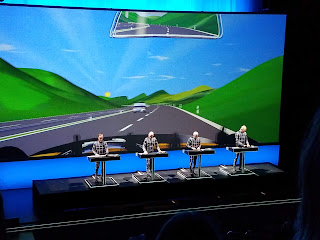Kraftwerk 3-D
Arlene Schnitzer Concert Hall
Arlene Schnitzer Concert Hall
July 8, 2022
Why are we here? What is our purpose? Is life a dream or an elaborate, predetermined program? Are we more machines than man now? Perhaps it's best to let German robots explain all this.
Those are heavy questions, of course. And while witness accounts of Kraftwerk 3-D may vary, this multimedia presentation seemed intent on exploring universal truths and the challenges of modern human existence.
Lest you think this whole enterprise sounds uncomfortable — and that, by the end, you'd be imploring HAL 9000 to open the pod bay doors — it was quite the opposite. By way of introduction, the talent onstage is founding Kraftwerk member Ralf Hütter (age 75), along with Henning Schmitz, Fritz Hilpert, and Falk Grieffenhagen. Wearing neon-lined body suits redolent of the movie "Tron," they manned individual, rectangular podiums while an unrelenting spectacle of 3-D-enhanced video played on a giant screen behind them. UFOs violated your airspace, protruding satellite antennas made you duck, sound waves bounced, 8-bit cars sped down the Autobahn. It was a technicolor feast for the eyes, but the subversive Kraftwerk ethos still burrowed into the psyche, going past the optic nerves and straight into the hippocampus and beyond.
The best concert experiences draw you in, and deliver something unexpected. This futuristic extravaganza certainly did that. Just as the 3-D screen lent a sense of space and depth, the seemingly basic subject matter of songs like "Numbers," "Home Computer" and "Airwaves" blossomed into thought-provoking performance pieces. On a similar note, "Autobahn," "Tour de France" and "Trans-Europe Express" evoked forward movement and human progress, but given our recent history, one could not help but think of another band's theory of de-evolution.
Underneath Kraftwerk's beeps, circular rhythms and cyborgian vocals lies a key question: What happens at the intersection of man and machine? On this night, many answers were possible. "Computer Love," with its lyrics, "I don't know what to do, I don't know what to do/I need a rendezvous, I need a rendezvous" suggests a lot about how people connect in the modern age (and it's quite prescient for a song released in 1981). Elsewhere, the folly of man/machine was laid bare on "Radioactivity," as it called out nuclear-scarred cities and displayed radiation warning symbols onscreen.
Sobering nuclear outcomes aside, a rapt audience nonetheless sat with cardboard 3-D glasses on their faces while Hütter and crew — relying not only on substance, but resplendent, colorful style — reasserted Kraftwerk's innovation and immeasurable influence. Some of the haunting textures from "The Model" echoed goth-rock, one of many genres Hütter, Florian Schneider, Wolfgang Flür, and Karl Bartos either nudged along or made possible. At other points of the show, robot voices confirmed that things like Auto-Tune and Daft Punk were beamed down from the Kraftwerk mothership. Of course, any musician that ever touched a synthesizer or drum machine after 1970 can thank this quartet. Synth-pop, New Wave, Neue Deutsche Welle, disco, industrial, hip-hop, techno, and a legion of pop and rock acts are all branches of the Kraftwerk tree.
Masquerading as automatons, the original lineup of Kraftwerk gave their fans much to contemplate around identity and purpose. On this night, the tradition was continued by four men that, for all their amusing stoicism, were still recognizable as living beings. But in a chilling bit of future shock during "Robotronik," four actual robots danced onstage, without a human in sight. It was turbulent and purposeful: a synthetic, sensory-overloading tableau that rattled the cages of our 21st-century souls. It was artificial intelligence reminding us to be human.

